Overview
Understanding autism is a journey filled with questions and concerns, and blood work plays a vital role in this process. It helps identify co-occurring medical issues, nutritional deficiencies, and genetic factors that can significantly influence a child's development and behavior. While it's important to note that autism cannot be diagnosed solely through blood tests, these evaluations offer critical insights that can guide comprehensive treatment approaches.
As parents, knowing that there are ways to support your child’s health can be reassuring. Blood work can uncover underlying factors that might be affecting their behavior, paving the way for tailored interventions and improved care. This understanding not only enhances the overall well-being of children on the spectrum but also empowers families to make informed decisions.
We encourage you to consider these evaluations as part of a holistic approach to your child’s health. Sharing experiences and seeking support from others in the community can be invaluable. Together, we can foster a nurturing environment that prioritizes understanding and compassion.
Introduction
In the intricate landscape of autism diagnosis and management, blood work emerges as a vital tool, revealing crucial insights that extend beyond mere diagnosis. While autism itself cannot be identified through blood tests alone, these assessments play a significant role in detecting co-occurring medical conditions that often accompany autism spectrum disorder (ASD). From nutritional deficiencies to metabolic disorders, understanding a child's health through blood work can illuminate factors that may impact their behavior and development. As research continues to evolve, the integration of blood tests into autism care is increasingly recognized as a best practice, offering a pathway to more personalized and effective interventions.
This article delves into the multifaceted role of blood work in autism, exploring its implications for diagnosis, management, and the emotional support necessary for children and their families during this process. We invite you to join us on this journey of understanding, as we uncover the ways in which blood work can support not just the child’s health, but also the well-being of the entire family.
The Role of Blood Work in Autism Diagnosis and Management
Blood work for autism is crucial in diagnosing and managing this condition, especially in recognizing underlying medical issues that often accompany this spectrum disorder (ASD). While autism cannot be identified solely through medical tests, these evaluations offer valuable insights into a young person's overall well-being. They can reveal nutritional deficiencies, metabolic challenges, and genetic factors that may influence growth and behavior. For instance, testing for vitamin D levels, iron panels, and thyroid function can identify issues that might worsen behavioral symptoms or developmental delays.
Recent studies show that a significant number of youths with developmental disorders also experience co-occurring medical conditions, highlighting the vital role of blood work in their identification. Many individuals on the spectrum face additional hurdles such as sensory processing difficulties, sleep disturbances, and gastrointestinal issues, complicating their diagnosis and treatment. Recognizing and addressing these co-occurring conditions is essential for providing holistic care and support.
A compelling case study titled "Co-occurring Conditions in Autism" underscores the importance of this recognition, stressing that tackling these additional challenges is key to effective treatment.
Moreover, statistics reveal that 34.0% of mothers of children with ASD reported using prescription medications during pregnancy, in contrast to 9.3% of mothers of typically developing children. This statistic sheds light on the potential medical influences on developmental disorders and underscores the importance of thorough medical evaluations.
Professional insights reinforce the significance of blood work for autism in managing developmental disorders. Pediatricians advocate for regular testing as part of a comprehensive treatment approach, emphasizing that understanding a young patient's medical profile can lead to more effective interventions. As research continues to validate these findings in larger populations, the integration of blood work for autism into the care of developmental disorders is increasingly recognized as a best practice, ensuring that children receive the most appropriate and personalized support.
As noted by RE, who supervised the project and thoroughly reviewed the manuscript for significant intellectual content, the role of blood work for autism in managing this condition is indeed profound.
Types of Laboratory Tests Commonly Used for Autism
A range of laboratory evaluations, including blood work for autism, plays a vital role in assessing and diagnosing autism spectrum condition. These evaluations not only help identify potential underlying issues but also guide treatment approaches. Key categories of laboratory examinations include:
- Genetic Analysis: This assessment is essential for identifying genetic mutations or irregularities linked to developmental disorders. Recent advancements in genetic testing have improved diagnostic yield, although challenges persist, such as discrepancies in laboratory reporting. For example, the diagnostic yield of Chromosomal Microarray Analysis (CMA) may be limited by technical factors, with 17% of tests performed on platforms unable to detect all 500-kb copy-number changes. Referrals for genetic testing are often based on family history of developmental disorders or specific clinical features. Implementing standardized protocols can enhance the detection of genetic alterations, providing clearer insights into the genetic foundations of the condition. As Dr. Peter Raffalli from the Autism Consortium emphasizes, understanding these genetic factors is crucial for effective intervention.
- Nutritional Assessments: These evaluations examine deficiencies in essential nutrients, such as vitamin D, B12, and iron, which have been associated with behavioral and developmental challenges in youth with neurodevelopmental disorders. Nutritionists highlight the importance of comprehensive nutritional evaluations, as addressing deficiencies can lead to significant improvements in behavior and overall well-being.
- Thyroid Function Tests: Evaluating thyroid hormone levels is critical, as thyroid dysfunction can adversely affect cognitive and physical development. Monitoring thyroid health is especially important in young individuals with developmental disorders, as it can impact their growth trajectory.
- Metabolic Panels: These examinations assess metabolic function and can detect conditions like phenylketonuria (PKU), which may influence behavior. Early detection through metabolic panels can lead to timely interventions that enhance outcomes.
Understanding blood work for autism empowers parents to engage in informed discussions with healthcare providers, enabling them to advocate effectively for their children's health and development. As the landscape of autism diagnosis evolves, staying informed about the latest testing options and their implications is vital for parents navigating this complex journey. Furthermore, implementing protocols and algorithms could enhance the detection of genetic alterations in youth with ASD, underscoring the importance of ongoing advancements in the field.
Preparing Your Child for Blood Tests: Tips and Strategies
Preparing your child for a medical examination is crucial in reducing stress and ensuring a smoother experience. Here are some effective strategies to help ease the process:
- Explain the Process: Use clear, simple language to describe what will happen during the blood test. Visual aids, such as diagrams or social stories, can be particularly beneficial in helping your child understand the procedure.
- Practice Relaxation Techniques: Introduce your child to deep breathing exercises or other calming techniques. Research indicates that children who practice these methods report lower anxiety levels before medical procedures.
- Bring Comfort Items: Encourage your child to bring along a favorite toy, blanket, or other comfort items. Familiar objects can provide a sense of security and help alleviate stress during the procedure.
- Choose the Right Time: Schedule the appointment for a time when your little one is typically calm and well-rested. Avoiding times when they might be hungry or tired can significantly reduce anxiety levels.
- Stay Positive: Your attitude can greatly influence your child's feelings. Maintain a positive demeanor and reassure them that they will be okay. Parents in a recent study noted that their children's anxiety levels were high before clinic visits, but they felt that positive reinforcement helped reduce stress during the actual procedure.
- Utilize Technology: Consider innovative approaches, such as robot-assisted fluid collection, which has shown promise in reducing anxiety. In a survey of 132 parents, those whose children engaged with a robot reported a significant reduction in their child's stress levels during medical examinations. Additionally, a survey of 128 parents revealed positive views on the effectiveness of social robots in collecting samples, highlighting the potential benefits of such technologies.
- Expert Tips: Pediatric psychologists suggest preparing your child by role-playing the experience or viewing videos that illustrate the procedure. This familiarity can help demystify the experience and reduce fear. As Roger J. Zoorob, MD, noted, "Despite effective treatments, some childhood anxiety disorders persist into adulthood," underscoring the importance of addressing anxiety in medical settings.
By implementing these strategies, you can assist your child in navigating the blood work for autism testing process with greater ease and confidence, ultimately leading to a more positive experience. Future research should focus on improving robot interaction capabilities, which could further enhance the effectiveness of these innovative approaches.
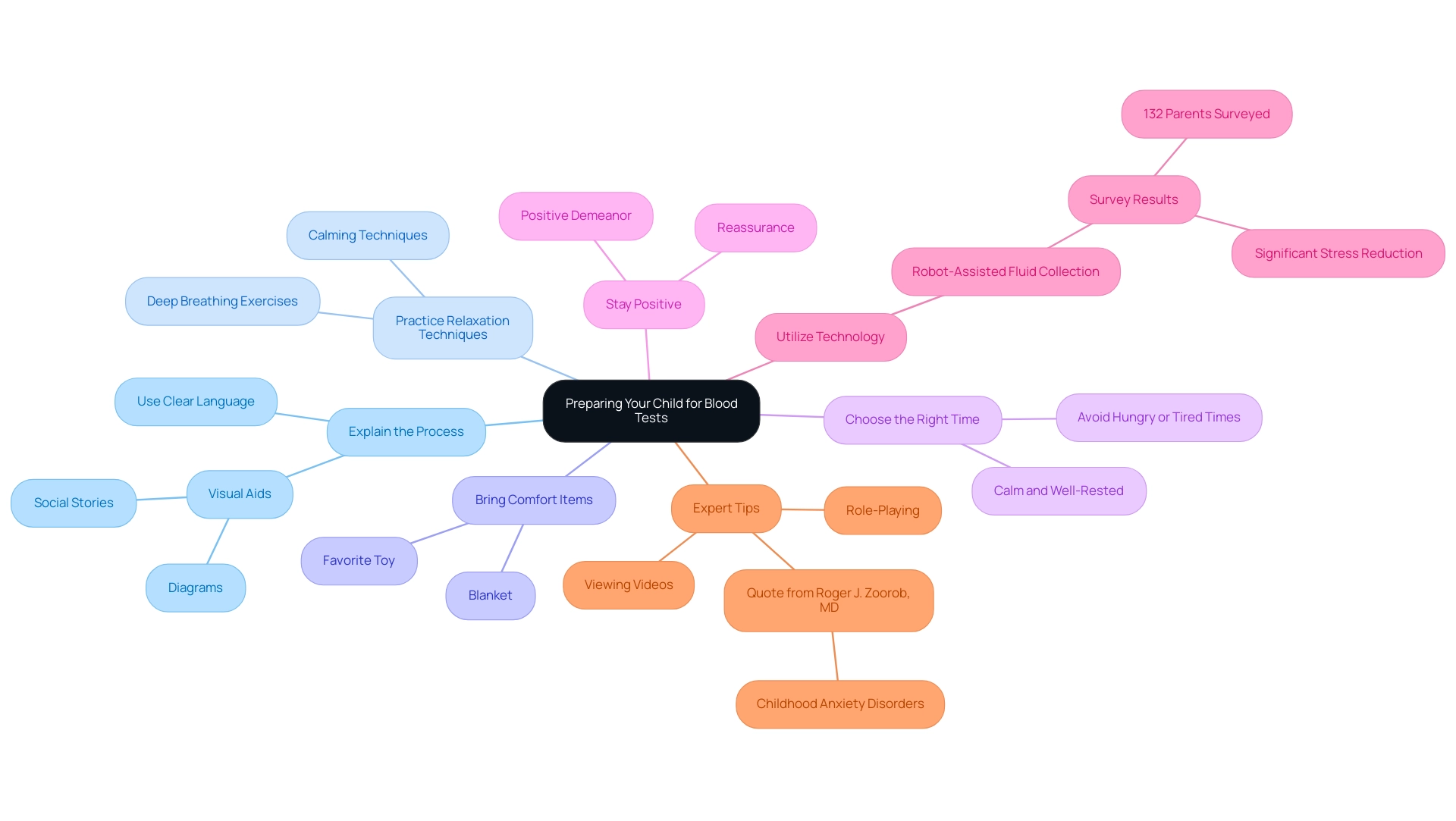
Emotional Support for Children During Blood Tests
Emotional support is vital in helping young individuals navigate the anxiety that often accompanies blood tests. To provide effective support, consider these strategies:
- Stay Close: Your presence can be a tremendous source of comfort. By remaining with your child during the procedure, you not only reassure them but also help to alleviate their anxiety. Research shows that parental presence can significantly reduce anxiety in young patients during medical procedures. A review titled "Impact of Parent Emotional Health on Offspring Outcomes" highlights that better emotional health in parents can enhance health outcomes for youth through improved parental involvement in care.
- Use Distraction Techniques: Engaging your child in conversation or directing their attention to a toy, video, or a favorite story can effectively shift their focus away from the procedure. These methods have been proven to enhance the overall experience for children undergoing blood tests.
- Validate Their Feelings: Acknowledge your child's fears and anxieties. Let them know that feeling scared is completely normal and that you are there to support them throughout the process. This validation fosters understanding and helps them feel less isolated in their experience.
- Praise and Reward: After the examination, recognize your child's bravery with praise and consider offering a small reward. This positive reinforcement not only celebrates their courage but also encourages a more favorable association with medical procedures in the future.
By incorporating these emotional support strategies, you can significantly improve the experience for children undergoing blood work, creating a sense of security and reducing anxiety. Furthermore, statistics indicate that parental presence during medical procedures can greatly influence anxiety levels in young individuals, underscoring the importance of parental involvement. As Meghan Marsac, PhD, from the Department of Pediatrics at Kentucky Children’s Hospital states, "Emotional support during medical procedures is vital for young patients, as it helps them cope with their fears and enhances their overall experience."
Case studies further demonstrate that when parents actively engage in emotional support, it can lead to improved health outcomes for their children, emphasizing the crucial role of parental involvement in medical settings.
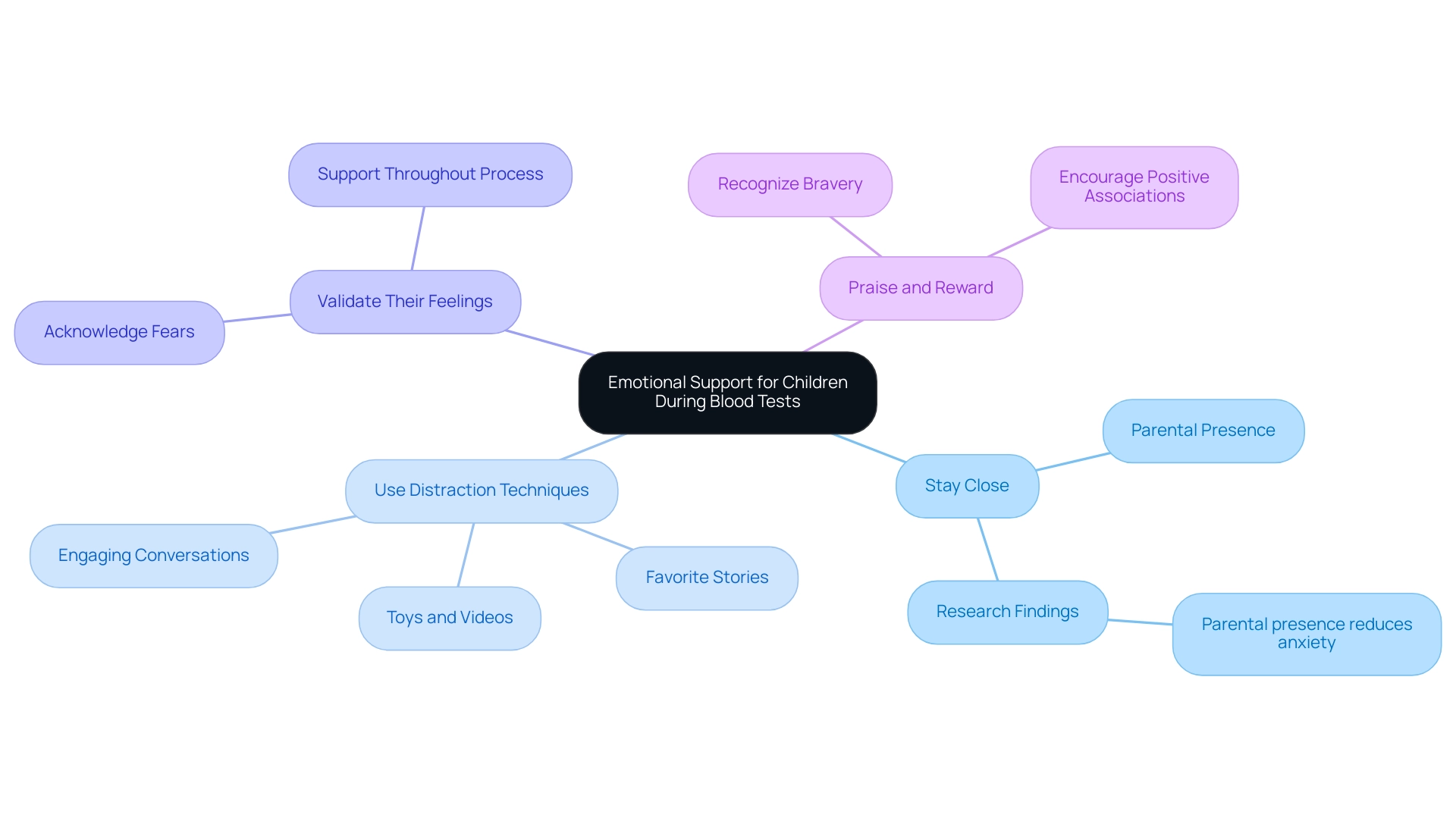
Interpreting Blood Test Results: What Parents Need to Know
Interpreting the results of blood work for autism can be a daunting journey for parents of children with autism. Here are some essential considerations to help you navigate this process with confidence and clarity:
- Consult with Healthcare Providers: Engaging in open dialogue with your child's healthcare provider is crucial. They can help clarify the significance of the results and guide you on the next steps. A systematic review highlighted that caregivers often favor early life screening and genetic testing, emphasizing the need for clear communication from healthcare professionals to empower parents. However, barriers such as cost and lack of information can hinder this process.
- Understand the Typical Ranges: Familiarizing yourself with the typical ranges for various lab analyses can provide a helpful reference point for interpreting your child's results. This knowledge can assist you in identifying any deviations that may warrant further investigation, such as blood work for autism.
- Look for Patterns: It's important to consider how blood work for autism may correlate with your child's symptoms or behaviors. For instance, if an assessment reveals a deficiency or abnormality, think about how this corresponds with any challenges your child faces.
- Follow-Up Evaluations: Be prepared for the possibility of additional assessments if initial results suggest potential issues. This proactive approach can lead to timely interventions. According to recent recommendations, children diagnosed with Autism Spectrum Disorder (ASD) should undergo evaluations for common coexisting medical conditions, which includes blood work for autism, with chromosomal microarray testing being a key component of the process.
- Statistics on Parental Understanding: Research indicates that a significant percentage of parents express a desire for more knowledge regarding laboratory results, particularly blood work for autism, and their implications. This underscores the importance of healthcare providers in facilitating informed discussions.
- Expert Guidance: Specialists advise that parents seek assistance in interpreting laboratory results, as understanding the importance of these evaluations can significantly affect treatment choices and outcomes. As noted by Marcio Leyser from the University of Iowa Stead Family Department of Pediatrics, "like with CMV and other congenital infectious diseases, prenatal exposure to Zika virus should also be considered a prenatal risk factor for ASD."
- Case Studies: Real-world examples illustrate how parents have effectively managed conversations regarding their examination results with healthcare providers. These stories often emphasize the significance of persistence and advocacy in ensuring that children receive appropriate care.
By approaching test results with a well-informed mindset and actively engaging with healthcare providers, you can better advocate for your child's health and well-being. Remember, you are not alone in this journey—support and resources are available to help you every step of the way.
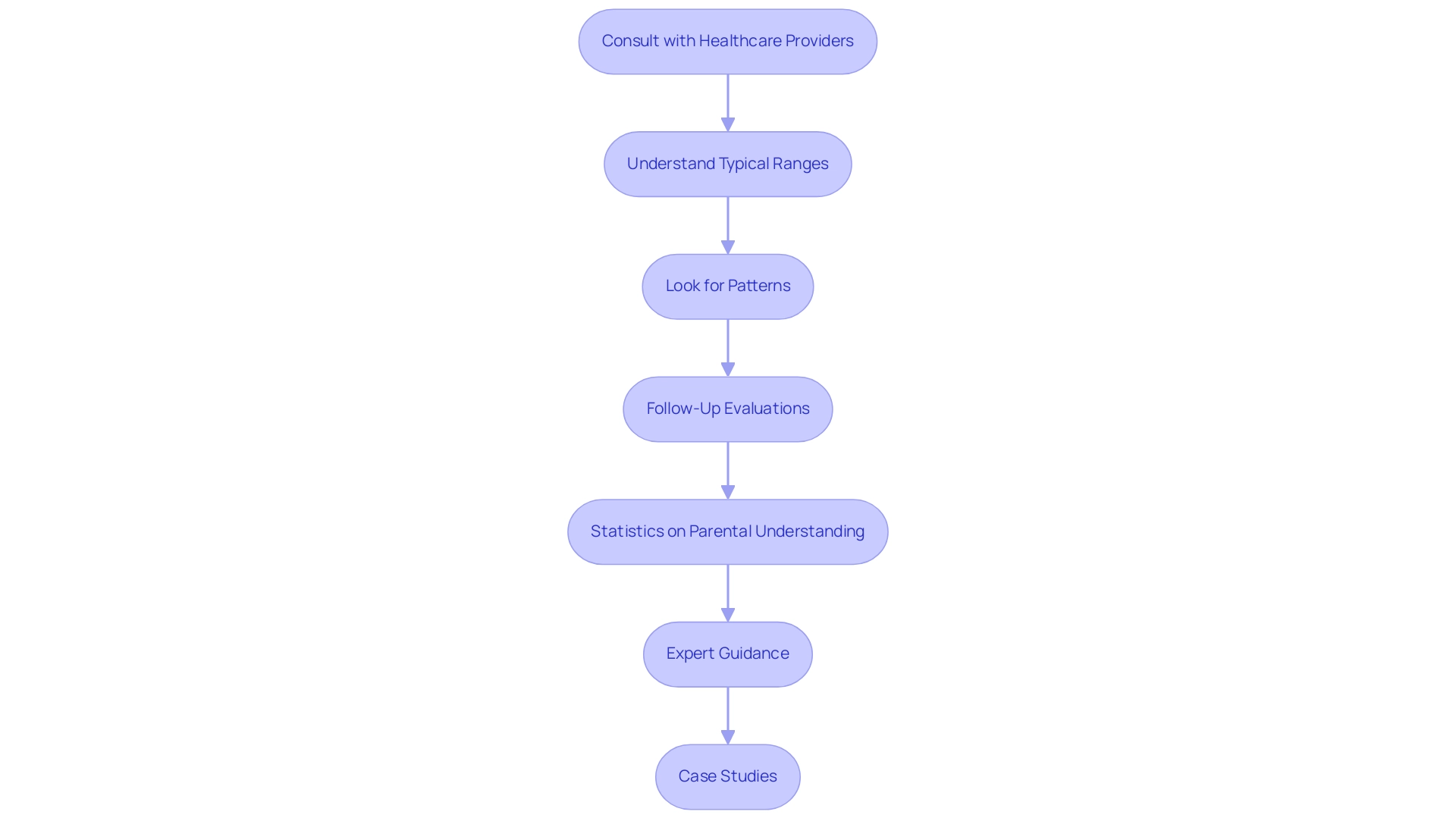
Recent Advances in Blood Testing for Autism: What’s on the Horizon
Recent advancements in testing for developmental disorders are paving the way for more effective detection and diagnosis, offering hope to families navigating these challenges. Key developments include:
- Biomarker Research: Ongoing studies are dedicated to identifying specific biomarkers in blood that may indicate the risk or severity of developmental disorders. This research is essential, as it seeks to reveal environmental toxicant biomarkers associated with these conditions. However, interpreting these biomarkers can be complex, influenced by factors such as heavy metals and air pollutants, which complicate our understanding of their implications for developmental disorders.
- Genetic Screening Innovations: The field is witnessing the emergence of new genetic evaluations designed to detect mutations associated with developmental disorders with greater accuracy. These advancements are crucial for timely diagnosis and intervention, potentially leading to better outcomes for affected individuals and their families.
- Machine Learning Applications: Researchers are increasingly utilizing machine learning methods to examine samples, looking for patterns related to autistic characteristics. This innovative approach not only enhances the accuracy of identifying developmental disorders but also opens doors for tailored treatment strategies that resonate with individual needs.
- Prenatal Testing: Promising studies are underway to investigate the viability of prenatal blood work for autism, which could evaluate risk in unborn individuals. This could revolutionize early intervention strategies, allowing for proactive support from the earliest stages of development.
- Case Study Insights: A recent study involving 154 male pediatric subjects, divided into an ASD group and a typically developing group, provided valuable demographic context and insights into co-morbid conditions. This analysis is vital for understanding the traits of participants connected to biomarker research, offering families a clearer picture of their children's experiences.
These advancements indicate a hopeful future for the identification and diagnosis of developmental disorders, with the potential to transform how we perceive and address these conditions. As Dr. Yolanda de Diego-Otero, project lead, observed, integrating these innovative testing methods may lead to more tailored and effective interventions for children with developmental disorders. Furthermore, upcoming uses of serum analysis may involve risk assessment and treatment supervision, enhancing the overall care strategy for families affected by these conditions. We encourage parents to stay informed and engaged, as these developments could significantly impact their children's lives.
Addressing Common Concerns About Blood Tests for Autism
Parents often express concerns about tests for autism, and understanding these issues can help ease anxiety. Let's explore some common worries and clarify them together:
- Pain and Discomfort: While some discomfort during venipuncture is expected, various techniques can significantly lessen pain. For example, using smaller needles and applying numbing creams can make the experience more comfortable for young patients. A survey of 128 phlebotomists found that comforting techniques—like providing clear explanations, utilizing distractions, and involving child life specialists—can greatly enhance a young person's experience during blood draws. These methods not only help reduce immediate anxiety but also play a vital role in preventing a lifelong fear of needles. Additionally, the structure of pain evaluation scales, such as face scales, can influence pain ratings in clinical settings, offering a more accurate understanding of a child's discomfort.
- Accuracy of Results: It's important to note that tests are not definitive for diagnosing autism. However, they can provide valuable insights into co-occurring conditions, which are essential for comprehensive care. Research shows that accurately identifying these conditions can lead to more effective treatment strategies, raising the question of the necessity of blood work for autism. Engaging in open discussions with healthcare providers about the potential benefits and implications of testing can offer clarity and reassurance. Guidance should also be provided to parents regarding the use of pain assessment scales, as highlighted by Anna-Kaija Palomaa, RN, MNSc.
- Impact on Child: The emotional impact on children is a significant concern for parents. Preparing young ones for the testing process and offering continuous support can help ease fears and anxieties. In fact, statistics reveal that 83% of parents are actively involved in their child's pain assessment, underscoring the importance of parental engagement in managing their experience. Moreover, recent studies investigate how to identify children at high risk for adverse reactions to painful medical procedures, addressing the worries parents may have about their child's experience during tests. By tackling these common concerns with informed strategies and insights, parents can better navigate the testing process for developmental disorders, ensuring a more positive experience for their children.
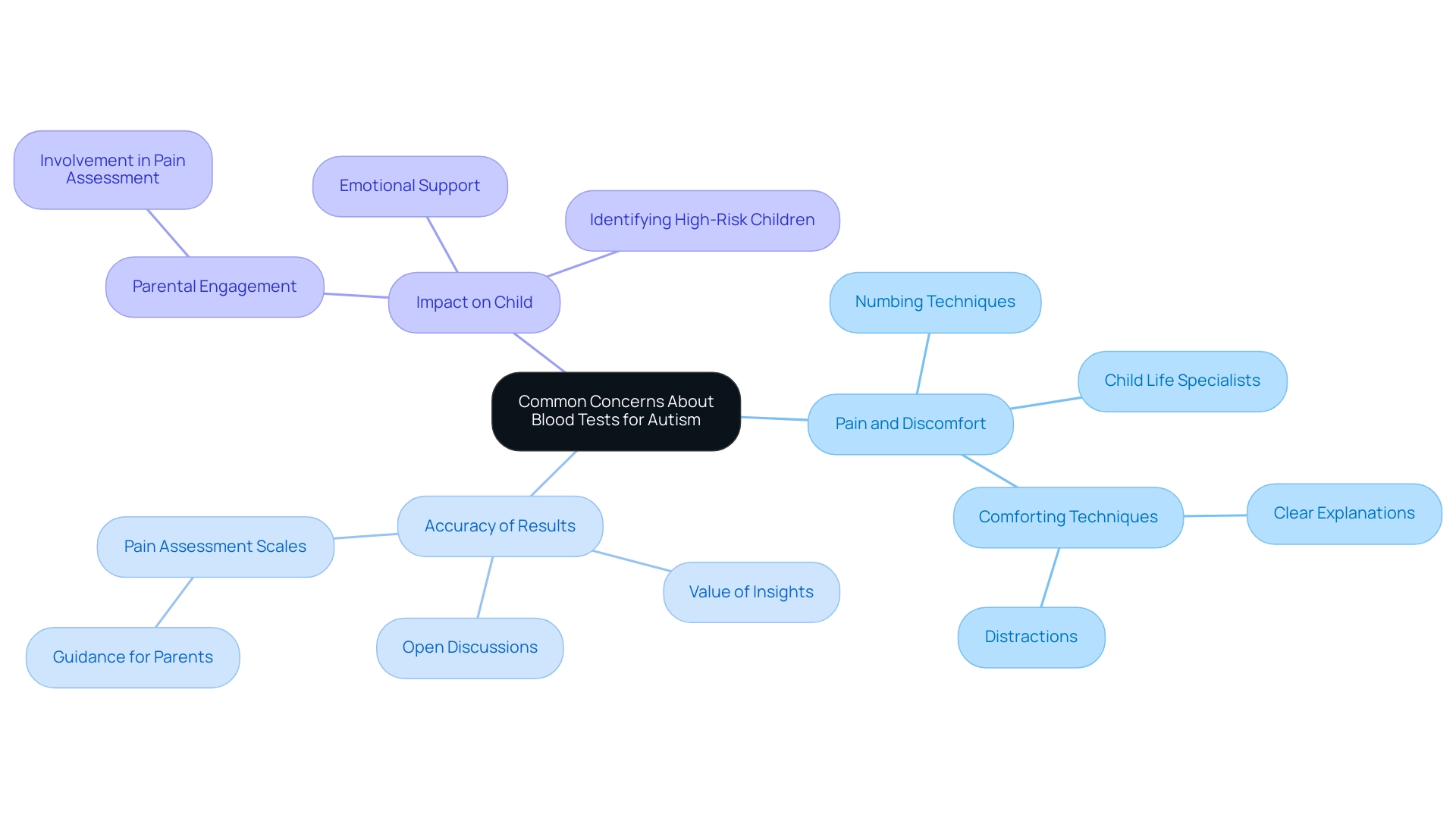
Resources and Support for Parents: Navigating Blood Work for Autism
Navigating testing for autism can be a challenging experience for parents, yet a wealth of resources is available to provide essential support.
- Parent Support Groups: Engaging with local or online support groups can offer invaluable emotional support and a platform for sharing experiences. These groups foster a sense of community, which is crucial for parents facing similar challenges. Leaders of these groups often emphasize the importance of connection, stating that sharing experiences can significantly alleviate feelings of isolation. As noted by Si Ni Wai Tong Chien, the optimal intervention duration and target participants are critical, highlighting the need for parental involvement in these support systems.
- Educational Materials: Resources such as Autism Speaks and the Autism Community in Action (TACA) provide comprehensive guides and toolkits designed to help parents navigate medical procedures. These materials frequently contain detailed instructions and advice for getting youngsters ready for lab tests, making the process less daunting.
- Healthcare Provider Resources: Many pediatricians and specialists are equipped with resources and can provide referrals to extra support services. They can assist parents on what to anticipate during the testing process and how to prepare their kids emotionally and physically.
- Workshops and Webinars: Participating in workshops that focus on preparing youngsters for medical procedures can be beneficial. These sessions often provide practical strategies and insights from experts, helping parents feel more confident in managing their child's healthcare needs.
- Statistics on Support Group Effectiveness: Research indicates that parent support groups can significantly improve parental well-being. For instance, studies using validated self-report instruments have shown that parents who participate in these groups report lower levels of anxiety and perceived stress, highlighting the positive impact of community support.
- Case Studies on Maternal Stress: A study examining the relationship between maternal stress and family income found a significant correlation, suggesting that financial stability can influence maternal stress levels. This underscores the importance of accessible resources and support systems for families navigating the complexities of autism-related medical procedures, particularly in managing blood work for autism.
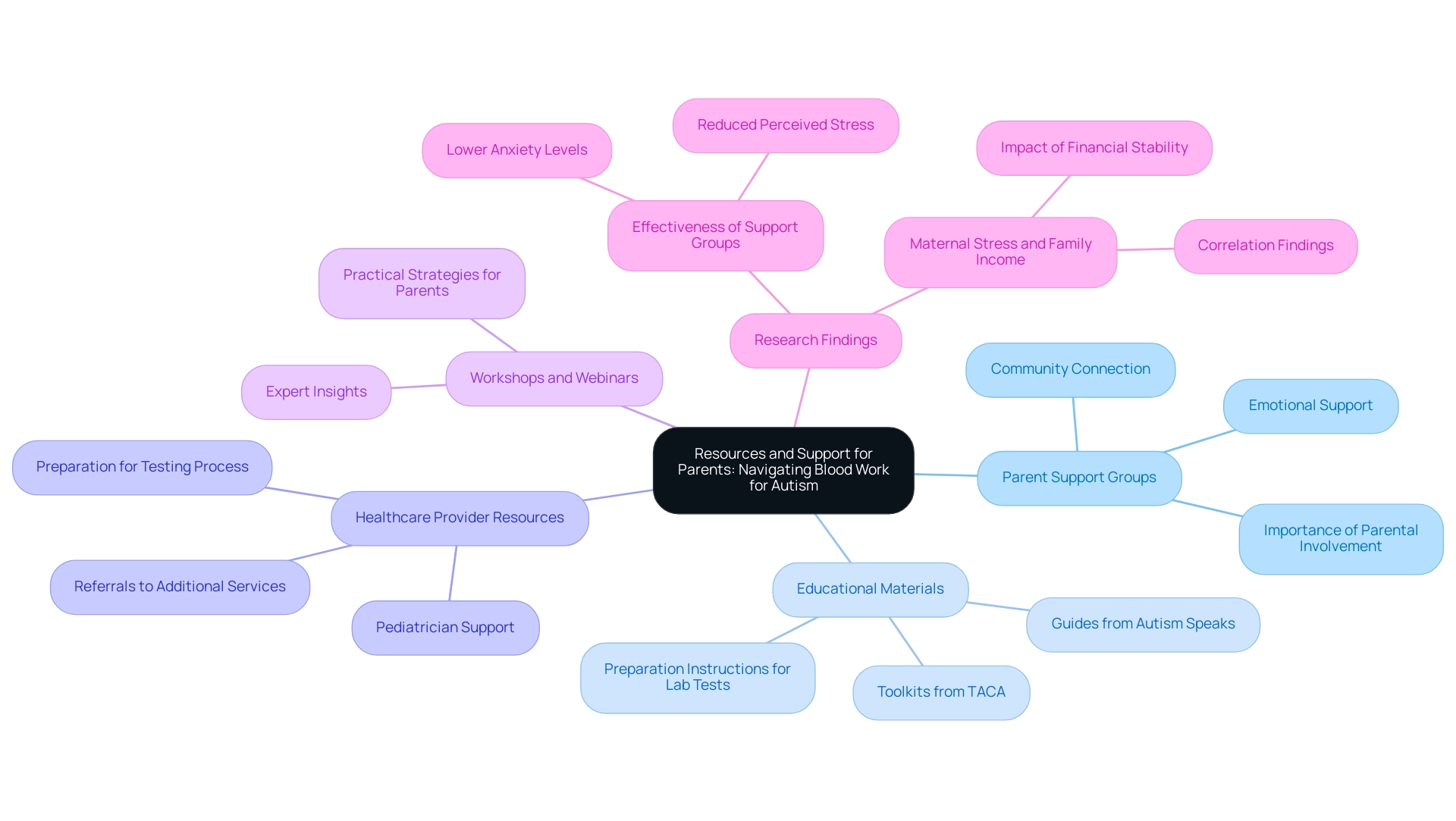
Conclusion
Blood work plays a crucial role in diagnosing and managing autism, offering valuable insights into the co-occurring medical conditions that often affect children with autism spectrum disorder (ASD). Although blood tests alone cannot diagnose autism, they can reveal nutritional deficiencies, metabolic disorders, and genetic factors that may influence a child's development and behavior. By understanding these underlying issues, families can collaborate with healthcare providers to create personalized interventions that truly meet their child's needs.
Preparing children for blood tests and providing emotional support can significantly alleviate anxiety and enhance their experience. Strategies such as:
- Explaining the process
- Utilizing distraction techniques
- Ensuring parental presence
can provide comfort during this often-stressful time. Moreover, being well-informed about blood test results empowers parents to engage effectively with healthcare professionals, advocating for their child's health with confidence.
As advancements in blood testing continue to evolve, the potential for more accurate diagnoses and personalized treatment strategies grows. Innovations in genetic testing and biomarker research are paving the way for improved autism care, offering hope and new possibilities for families.
Integrating blood work into autism management not only deepens our understanding of the condition but also bolsters the overall well-being of children and their families. This holistic approach addresses immediate health concerns while fostering better outcomes, ultimately leading to a higher quality of life for those affected by autism. Together, we can embrace these advancements and support each other on this journey.
Frequently Asked Questions
Why is blood work important for diagnosing autism?
Blood work is crucial for diagnosing autism as it helps identify underlying medical issues that may accompany autism spectrum disorder (ASD), such as nutritional deficiencies, metabolic challenges, and genetic factors that can influence growth and behavior.
Can autism be diagnosed solely through blood tests?
No, autism cannot be identified solely through medical tests. However, blood evaluations provide valuable insights into a young person's overall well-being and can reveal factors that might worsen behavioral symptoms or developmental delays.
What specific conditions can blood work help identify in individuals with autism?
Blood work can help identify nutritional deficiencies (like vitamin D and iron), thyroid dysfunction, and metabolic disorders, which may contribute to behavioral challenges and developmental issues.
What is the significance of recognizing co-occurring medical conditions in individuals with autism?
Recognizing co-occurring medical conditions is essential for providing holistic care and support, as many individuals on the spectrum face additional challenges such as sensory processing difficulties, sleep disturbances, and gastrointestinal issues that complicate their diagnosis and treatment.
What role do pediatricians see for blood work in managing developmental disorders?
Pediatricians advocate for regular blood testing as part of a comprehensive treatment approach, emphasizing that understanding a young patient's medical profile can lead to more effective interventions.
How does genetic analysis contribute to the understanding of autism?
Genetic analysis helps identify genetic mutations or irregularities linked to developmental disorders, improving diagnostic yield and providing clearer insights into the genetic foundations of autism, which is crucial for effective intervention.
What types of nutritional assessments are relevant for children with autism?
Nutritional assessments examine deficiencies in essential nutrients, such as vitamin D, B12, and iron, which have been associated with behavioral and developmental challenges in youth with neurodevelopmental disorders.
Why are thyroid function tests important for children with autism?
Thyroid function tests are important because thyroid dysfunction can adversely affect cognitive and physical development, making it critical to monitor thyroid health in young individuals with developmental disorders.
What are metabolic panels, and why are they significant?
Metabolic panels assess metabolic function and can detect conditions like phenylketonuria (PKU), which may influence behavior. Early detection through these panels can lead to timely interventions that enhance outcomes.
How can parents use information about blood work for autism to advocate for their children?
Understanding blood work for autism empowers parents to engage in informed discussions with healthcare providers, enabling them to advocate effectively for their children's health and development.




